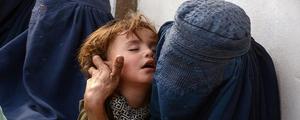Story Highlights
- 90% of Afghans say it is difficult or very difficult to get by on household income
- 92% think it’s a bad time to find a job
- 86% have been unable to afford food
This article is part of a series based on Gallup’s surveys in Afghanistan one year after the Taliban’s takeover.
WASHINGTON, D.C. -- As grim as Afghans’ economic prospects were when the Taliban returned to power last year, they look even worse a year later.
The latest Gallup data from surveys conducted in Afghanistan one year after the Taliban took over show unprecedented numbers of Afghans are finding it very difficult to get by on their household incomes and struggling to afford food and shelter. They are also almost universally grim about the job climate and the outlook for their economy.
Nine in 10 Afghans Finding It Difficult to Make Ends Meet
Since the Taliban came to power in August 2021, the country’s economy has contracted sharply, leading to rising food insecurity and shrinking household incomes. On top of this, prices have increased rapidly, with high inflation reducing the value of people’s earnings and pushing more into a state of deprivation.
In the current climate, nine in 10 Afghans say they are finding it “difficult” or “very difficult” to get by on their present household income. While Afghans have struggled significantly in the past five years, the 71% who currently say they are finding it very difficult is a record high -- and represents an increase of 14 percentage points from 2021.
Falling labor earnings and rising unemployment aren’t helping these feelings. In January of this year, the International Labour Organization estimated that job losses could reach 900,000 by midyear, and other recent data show more Afghans are turning to self-employment and low-productivity jobs.
Reflecting Afghans’ growing discouragement, the percentage who say it is a bad time to find a job in their communities soared to a record 92% in 2022, shattering the previous high of 84% in 2021.
Record-High Numbers of Afghans Struggling to Afford Food, Shelter
Recent World Food Programme (WFP) assessments estimate that half of Afghanistan’s population -- almost 20 million people -- are currently suffering from crisis or emergency levels of food insecurity. And for the first time in more than a decade, the WFP has detected that more than 20,000 in one province were suffering from catastrophic levels of food insecurity.
Between 2021 and 2022, the percentage of Afghans who have been unable to afford food they and their families need shot up 11 points to 86%. This is not only a new record high for Afghanistan, but it also statistically ties the world record for any country over the past 16 years (87% set by the Central African Republic in 2010).
In addition to lacking money for food, a record-high 73% of Afghans also reported lacking enough money for adequate shelter in the past 12 months. This is the highest level in the trend’s history, dating to 2008, and up 15 points from the previous year.
Nine in 10 Afghans Do Not See Better Economic Conditions Ahead
The World Bank estimates that real GDP in Afghanistan will shrink further -- close to 30% to 35% from 2021 to 2022 -- on top of a prediction of no improvement in per-capita income. Poverty is expected to remain widespread in the country. While humanitarian aid totaling around $1.8 billion has been sent from the international community, Afghans are almost universally negative about the outlook for their economy. In fact, 90% of them believe that their local economic conditions are getting worse.
Bottom Line
The economic prospects for Afghanistan have remained grim one year out from the Taliban takeover. With their GDP contracting, incomes decreasing and unemployment rising -- particularly among women -- record numbers of Afghans report struggling to afford even the most essential of needs.
The country is essentially a cash-only society, and yet the Afghan central bank recently reported that it cannot replace paper bills -- like the economy itself, the paper currency is falling apart. With economic systems crumbling, Afghanistan is at risk of a further downward spiral that can increase political instability and external threats in the entire region and beyond.
For complete methodology and specific survey dates, please review Gallup's Country Data Set details.
Learn more about how the Gallup World Poll works.




